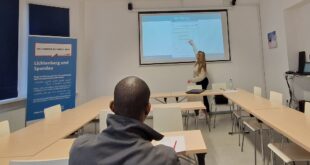If you’re thinking of returning to your country of origin but have questions about what life is like in the country or what support you can receive once you’ve gone back, virtual counselling may provide you with the help you need.
Virtual Counselling is a free service from IOM that lets you speak with a counsellor in your country of origin on WhatsApp or Viber. When migrants in Germany call a virtual counsellor, they are speaking directly with someone on the ground, and receive reliable information in their native language.
A virtual counsellor will answer their questions on everything from employment and healthcare to housing and education. They will outline the return assistance and reintegration opportunities offered by the German government and IOM.
A conversation with a virtual counsellor is always unbiased, and anonymous and free of charge. People can speak with a virtual counsellor without revealing their name or having made up their minds to return. They get the information they need to make an informed decision.
Virtual Counselling goes beyond conveying neutral and up-to-date information about the situation in the country of origin. It is also a process that can identify the vulnerabilities and needs of the migrants, as these aspects have an impact on the sustainability of the reintegration. They also receive first-line emotional support, helping potential returnees to work through their emotions and to make choices for their future.
If they decide to return, a virtual counsellor like Armen from IOM Armenia can help them to prepare for their return and reintegration. As a virtual counsellor, he is one of the many IOM staff members working worldwide to offer migrants accurate information about life in their countries of origin, before they make any decision to return. “I explain in detail all the steps, how the return counsellors in Germany will help them with the plane tickets and assist with the documents,” explains Armen.
Upon arrival, Armen shares his phone number so that returnees can reach him on Viber or WhatsApp. “I’m not going anywhere,” he says. “They know me and know that I will be helping them, which reassures them.”
The people who use Virtual Counselling all have unique stories. Many consider returning because they feel the situation in their country has improved. Others had come to Germany hoping for a better life – a decent salary, a stable job – but achieving this proved difficult. Some may have had their asylum application rejected, thereby losing the right to remain in Germany and so spurring a decision to return voluntarily.
Among the elderly, many reminisce about life in their homeland. “My land, my water, my homeland is calling me” is a common refrain. They sometimes no longer feel comfortable in Germany, or they miss their families who they were unable to bring to Germany.
Most people using the Virtual Counselling service enquire about the financial support they would receive if they chose to return through the Assisted Voluntary Return and Reintegration (AVRR) programmes, the necessary documents and even their flight details. At this early stage, a virtual counsellor will refer people to counselling centres across Germany, where they can schedule an appointment with a return counsellor. Many also have questions about healthcare in their country. A virtual counsellor will explain how they can access the governmental health insurance scheme once they have returned, or receive medical assistance through return and reintegration programmes.
Importantly, the well-being of children is prioritized throughout the process – from the first counselling session to reintegration. In fact, parents are often more concerned about their children than themselves. Many children came to Germany when they were babies or were even born in Germany. Some do not speak the local language, so parents naturally worry about their reintegration in school. For these cases, a virtual counsellor will explain the reintegration procedure through which children can get support.
Even after migrants have arrived in their country of origin, the support from a virtual counsellor does not end there. A virtual counsellor will issue their payments and guide them through the reintegration process. For Armen, seeing the returnees succeed makes his job worthwhile. “My favourite part is when, after some time of being in touch, you feel trust and joy in their voice.”
Getting support for voluntary return
If you are interested in learning more about the assisted voluntary return and reintegration programmes, you can find more information on ReturningfromGermany.de. With over 900 counselling centres across Germany, it is easy to find a centre near you.
If you’re interested in counselling in your country of origin, you can get in touch with a virtual counsellor like Armen who speaks your native language. The Virtual Counselling project operates in 19 countries worldwide, including Ghana, Nigeria, and The Gambia. You can contact IOM’s virtual counsellors through WhatsApp, Skype, Viber, and Facebook in the language with which you are most comfortable.
The return and reintegration programmes are financed by the Federal Office for Migration and Refugees (BAMF), the German Government, the Federal States, and the European Union (EU).
 THE AFRICAN COURIER. Reporting Africa and its Diaspora! The African Courier is an international magazine published in Germany to report on Africa and the Diaspora African experience. The first issue of the bimonthly magazine appeared on the newsstands on 15 February 1998. The African Courier is a communication forum for European-African political, economic and cultural exchanges, and a voice for Africa in Europe.
THE AFRICAN COURIER. Reporting Africa and its Diaspora! The African Courier is an international magazine published in Germany to report on Africa and the Diaspora African experience. The first issue of the bimonthly magazine appeared on the newsstands on 15 February 1998. The African Courier is a communication forum for European-African political, economic and cultural exchanges, and a voice for Africa in Europe.






















